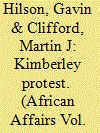|
|
|
Sort Order |
|
|
|
Items / Page
|
|
|
|
|
|
|
| Srl | Item |
| 1 |
ID:
120917


|
|
|
|
|
| Publication |
2013.
|
| Summary/Abstract |
This article critically reflects on what impact a supported and formalized artisanal and small-scale mining (ASM) sector could have in Northern Ghana, where poverty is deeply rooted, the outcome of decades of government neglect. Since independence in 1957, numerous attempts have been made to improve the living standards of the populations in the country's North but deteriorated human resource bases and shortages of infrastructure have limited their effectiveness. A recent upsurge in ASM activity, however, has catapulted the region on to another - previously unimaginable - growth trajectory entirely. As findings from research carried out in the township of Kui in Bole District of the country's Northern Region illustrate, ASM has injected considerable wealth into many of Ghana's Northern localities, in the process helping to stabilise their economies and alleviate the hardships of tens of thousands of farm-dependent families. The intensification of support to, and the formalisation of, ASM, could prove to be an important step toward eradicating a poverty problem that has plagued this region of sub-Saharan Africa for more than a century.
|
|
|
|
|
|
|
|
|
|
|
|
|
|
|
|
| 2 |
ID:
098086


|
|
|
|
|
| Publication |
2010.
|
| Summary/Abstract |
The temporary suspension of diamond exports in Ghana in 2006 and 2007 is arguably the most significant move to address mounting criticisms of the Kimberley Process Certification Scheme (KPCS), an international initiative aimed at stemming the flow of rough diamonds used to finance wars. The ban, which took effect in November 2006, was much praised, particularly in civil society circles, where it continues to be seen as a genuine effort to prevent the smuggling of 'conflict diamonds'. At the time, Ghana was accused of harbouring stones originating from rebel-held territories in neighbouring Côte d'Ivoire. No evidence was found in support of the case that it was a repository for 'conflict diamonds', however, and exports resumed early in March 2007. This article examines the context for the accusations of Ghana's implication in the smuggling of illicit diamonds, and draws on recent fieldwork to explain how the suspension has affected Akwatia, the country's main diamondiferous area. The actions taken raise important questions about how suspected violators - particularly smaller diamond-producing nations - of the KPCS should be handled, and underscore how global compacts can have a host of negative repercussions at the village level.
|
|
|
|
|
|
|
|
|
|
|
|
|
|
|
|
| 3 |
ID:
078567


|
|
|
|
|
| Publication |
2007.
|
| Summary/Abstract |
This article critically reflects upon the shortcomings of the 'Prestea Action Plan', an ambitious initiative undertaken to facilitate the resettlement of artisanal miners operating in the Western Region of Ghana. The aim of the exercise was to identify viable areas for the thousands of operators who were working illegally in the town of Prestea, an area under concession to the US-based multinational, Golden Star Resources Ltd. At the time of its launch, it was one of the few support initiatives to target artisanal miners, whose claims to land are generally not recognized by governments. It was a particularly significant exercise in Ghana because it suggested that the authorities, who traditionally have exercised a policy of non-negotiation with such groups, had finally recognized that dialogue was needed if the growing rift between the country's indigenous artisanal miners, foreign mining companies and government bodies was to be bridged. It soon emerged, however, that despite its commendable policy objectives, the Plan was fundamentally flawed-problems which would undermine the entire exercise
|
|
|
|
|
|
|
|
|
|
|
|
|
|
|
|
|
|
|
|
|